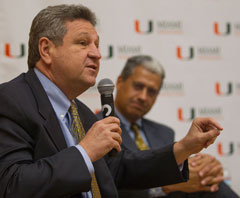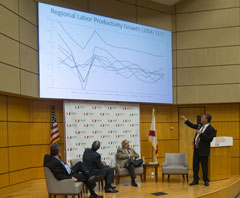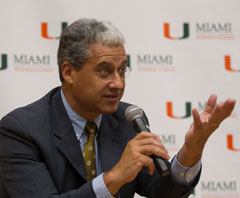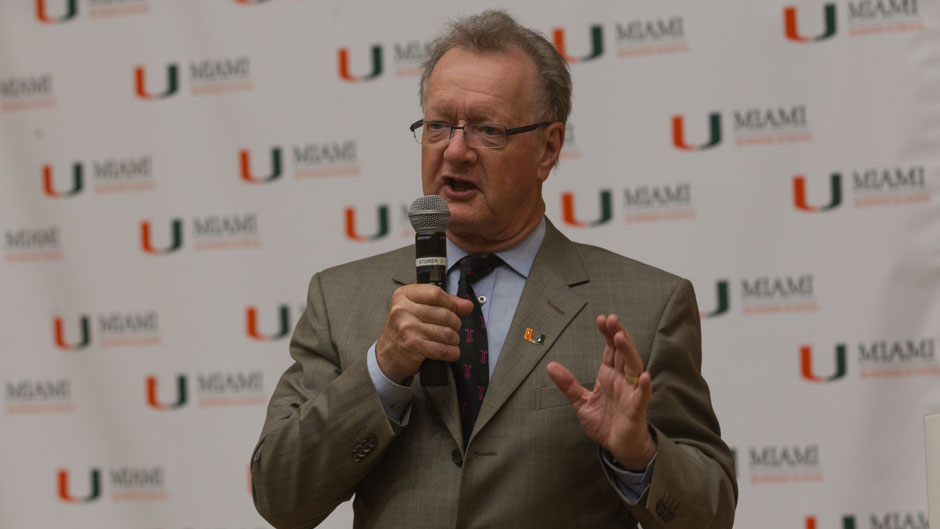The technology revolution is here, as the title of a recent discussion program suggests: Future|Now. The program, a series of three panels on transformation in the field of business, with practitioners alongside researchers and business experts from the University of Miami School of Business Administration (SBA), was part of the 41st annual conference on the Caribbean and Central America.
“Investing in the Caribbean is a no-brainer,” recalled SBA Dean John Quelch from the previous evening’s discussion session. “What we are doing here, right now, as the University of Miami School of Business Administration, is investing in the Caribbean and Central America by having the privilege of hosting this event and sharing our ideas with you.”
The three-day Caribbean-Central American Action (CCAA) business conference, held at the Hotel Colonnade in Coral Gables, focused on trade facilitation and security, included discussion of policy issues and their implication in U.S.-regional engagement, and gathered from across the region ambassadors, government officials, entrepreneurs and SBA faculty.
The special Thursday afternoon program at UM, held in Storer Auditorium, focused on transformation of production, people and healthcare in the Caribbean and Central America region with the thread of understanding that “technology is the driver of the world today,” said Robert Plant, associate professor and chair of the Department of Business Technology at SBA. “If you’re not ready for the future,” he added, “it’ll just take you like a tsunami and you’ll be washed away.”
Presenting on some of his latest research findings, Plant prefaced his conclusions with a warning that this digital and technological takeover of machines subsuming human workers and the middle class “may seem to some a dark world, but it is the reality of transformation.”
“If you’re not a technology company, you’re either going to be subsumed by the technology companies or you’re going to have to transform and become a technology company in its own right,” Plant said. “This is just the truth.”
The business tech expert shared an anecdote about replacing his appliances after his home was under four feet of water post-hurricane Irma. Plant explained how his order from Amazon arrived in four days, but when he ordered from a traditional company, like Bosch or LG, “it’s this labyrinthal process rooted in history” with a maze of dealers and suppliers and shippers and “all of this being very opaque to the consumer,” he said. “I’m just trying to figure out where my washing machine is.”
 The implied benefit for countries in the Caribbean and Central America facing this tech revolution is the ability to leapfrog traditional or formal institutions or convoluted business processes. And not just leapfrogging by rushing to make the cheapest product, which has been the “name of the game for at least 60 years,” said Alejandro Ruelas-Gossi, lecturer in the Department of Management at SBA, and what he calls the “Maquiladora syndrome.” But, whether it is livestock from New Zealand, avocados from Mexico or copper from Chile, it’s not just about making the cheapest product but about augmenting the value of that unique product.
The implied benefit for countries in the Caribbean and Central America facing this tech revolution is the ability to leapfrog traditional or formal institutions or convoluted business processes. And not just leapfrogging by rushing to make the cheapest product, which has been the “name of the game for at least 60 years,” said Alejandro Ruelas-Gossi, lecturer in the Department of Management at SBA, and what he calls the “Maquiladora syndrome.” But, whether it is livestock from New Zealand, avocados from Mexico or copper from Chile, it’s not just about making the cheapest product but about augmenting the value of that unique product.
“Each country should identify their own vantage point, to find their own path,” said Ruelas-Gossi.
Considering each country’s individual perspective also means understanding that high-tech like robotics and automation may not be the right fit for some small and rural economies, said Tomislav Kuljis, president of the Latin American Association of Supermarkets, founder and president of Hipermaxi in Bolivia and two-time SBA alum.
 “People still need their physical places, like fresh markets, so we might survive, but there is a big opportunity in virtual business,” added Kuljis.
“People still need their physical places, like fresh markets, so we might survive, but there is a big opportunity in virtual business,” added Kuljis.
The field of healthcare and telemedicine, which includes innovations such as using WhatsApp for doctor-patient communication, or doctors across the world communicating while together performing complex surgical procedures, provides its own set of opportunities to embrace. A. Parasuramam (Parsu) described his research on the technology readiness of people, or peoples’ propensity to embrace high-tech systems and innovations.
 “There’s quite a bit of heterogeneity in peoples’ proclivity to using cutting-edge technology,” said Parsu, professor and James W. McLamore Chair in marketing at SBA. “Some people are gung-ho about using technology to replace everything, other people are adamant about that human-to-human interaction, and still others are somewhere in between.”
“There’s quite a bit of heterogeneity in peoples’ proclivity to using cutting-edge technology,” said Parsu, professor and James W. McLamore Chair in marketing at SBA. “Some people are gung-ho about using technology to replace everything, other people are adamant about that human-to-human interaction, and still others are somewhere in between.”
Technology, especially in fields with a foundation in customer service and direct human interaction, such as healthcare and medicine, doesn’t need to be ominous, the panel participants explained.
“Technology is just a tool to provide healthcare,” said Antonio Marttos, Jr., a physician and associate professor of trauma surgery and director of global e-health at the UM Miller School of Medicine. A tool, it was stressed, that is particularly important in communities with low access to healthcare, such as guiding physicians in different countries on performing appendectomies or intricate surgical procedures, or even incorporating telemedicine in recovery efforts after the 2010 earthquake in Haiti.
The sense of engaging with one another through business and technology was summed up by Joseph Ganitsky, the director of the center for international business education and research (CIBER) at SBA and the organizer of the Future|Now conference program this Thursday afternoon at UM: “Miami is part of the Caribbean, it is part of the region. We are in this together and us, here at the University of Miami, are a solid partner for the region through our core business—education.”

